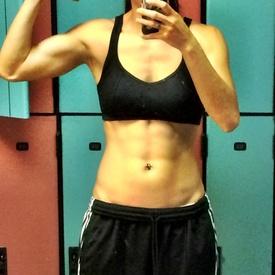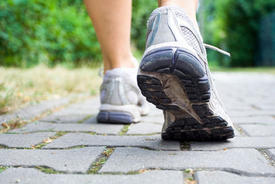Low heart rate. Same workout burn less

Wingg_
Posts: 395 Member
I have a low heart rate of like 42 per min, so when I workout the highest heart rate is 150 only. When I workout on the elliptical my heart rate is around 135-142 so I burn around only 100-110 cal for 20min which isn't much. I am short so I can only depend on working out to eat more but seeing the fact that I burn so little when I workout a lot, I am not motivated to workout.... Anything I can do so that I can burn more and eat more? What kind of exercise elevates heart rate the most? This is making my maintainence process difficult..
0
Replies
-
If you work out a lot you build endurance, meaning your heart rate will drop because you're fit. If you want to push it, you're going to have to change up your exercise to working other muscles to get your rate up and that will burn more calories.
Your resting heart rate is fantastic, and going from 42 to 150 is greatl
You can find sources on the net as to where your heart rate should be, when exercising. Keep in mind if it's too high that you will burn muscle instead of fat. And your heart is a muscle so you really don't want to get your heart higher than what it should be.0 -
If you work out a lot you build endurance, meaning your heart rate will drop because you're fit. If you want to push it, you're going to have to change up your exercise to working other muscles to get your rate up and that will burn more calories.
Your resting heart rate is fantastic, and going from 42 to 150 is greatl
You can find sources on the net as to where your heart rate should be, when exercising. Keep in mind if it's too high that you will burn muscle instead of fat. And your heart is a muscle so you really don't want to get your heart higher than what it should be.
Thanks for the advice! It's too good that my doctor suspect I may have bradycardia. I guess I just have to figure something out to burn more calories.0 -
You are not burning less calories because you have a low heart rate - heart beats are not a unit of energy!
Your HRM (or machine that detects heart rate) is just giving you an estimate based on average heart rates for the population, it does not and cannot actually measure how many calories you are expending.
Think of two identical weight cyclists cycling together up a hill. It takes a certain amount of power to do that. If one has a pulse of 120 and the other has a pulse of 150 they are still producing the same amount of power and burning the same calories.
No, that's actually very, very hard to do. Think extreme cardio (ultra marathons repeatedly for example) or a totally inadequate diet.Keep in mind if it's too high that you will burn muscle instead of fat.
No. Unless you have a heart condition it's not dangerous to hit your personal maximum heart rate, not particularly useful for training though. It's not something you can maintain anyway as you will quickly get exhausted. "Higher than it should be" will vary enormously between individuals. My tested maximum is 176 but my brother peaks over 200.And your heart is a muscle so you really don't want to get your heart higher than what it should be.0 -
If it is suspected you may have some disruption in your heart rhythm, I would try to look into this to see if there is an underlying reason, rather than ignore it. It is good you have a doctor who considers you, the person, rather than just another person in their office.
I am sure there are many, many reasons for heart rhythm's to be different, as many probably as there are people. I am also sure most of them are easily understood and if necessary addresses. One such cause could be if a person doesn't have optimal thyroid function, for them. Too high or low can cause so many issues. The Thyroid gland supports so many of the body's systems, because of this it can show symptoms in many different ways, especially needing fewer calories. This isn't just a problem for the older person because the modern diet can be deficient in essential minerals especially iodine, especially if one has been eating at a restriction for some time.
What ever the issues you have with weight loss etc. I hope they resolve very soon.0 -
You are not burning less calories because you have a low heart rate - heart beats are not a unit of energy!
Your HRM (or machine that detects heart rate) is just giving you an estimate based on average heart rates for the population, it does not and cannot actually measure how many calories you are expending.
Think of two identical weight cyclists cycling together up a hill. It takes a certain amount of power to do that. If one has a pulse of 120 and the other has a pulse of 150 they are still producing the same amount of power and burning the same calories.
No, that's actually very, very hard to do. Think extreme cardio (ultra marathons repeatedly for example) or a totally inadequate diet.Keep in mind if it's too high that you will burn muscle instead of fat.
No. Unless you have a heart condition it's not dangerous to hit your personal maximum heart rate, not particularly useful for training though. It's not something you can maintain anyway as you will quickly get exhausted. "Higher than it should be" will vary enormously between individuals. My tested maximum is 176 but my brother peaks over 200.And your heart is a muscle so you really don't want to get your heart higher than what it should be.
As above.0 -
HIGH INTENSITY INTERVAL TRAINING!0
-
Don't we burn more calories when we are at higher heart rate? Ten how come HRM shows more calorie burnt when at higher heart rate?0
-
Bradycardia just means a slow heart rate (normal is considered between 60-100 bpm). Some people just have slow heart rates, some people get them by becoming fitter and sometimes it's a sign of something amiss. Your doc can do an ECG and have a look at the rhythm pretty easily. If your resting heart rate is dropping after a period of increasing exercise though (usually months) then... high fives
 0
0 -
Don't we burn more calories when we are at higher heart rate? Ten how come HRM shows more calorie burnt when at higher heart rate?
not necessarily. HRM approximate calories burned from HR, but it's just an approximation derived from a formula that relates heart rate to calories burned. HRM aren't measuring calories burned, they can't do that.
This might help:
http://www.myfitnesspal.com/blog/Azdak/view/the-real-facts-about-hrms-and-calories-what-you-need-to-know-before-purchasing-an-hrm-or-using-one-214720 -
I have the opposite problem. I have a form of SVT called AVNRT...and my resting heart rate has been over 100 since I was stricken with this problem in September. Had surgery in Feb, and starting up exercise now, but every time I do anything, my heart rate flies up near 200. Irritating........anyway, just wanted to chime in and tell you to be sure and keep a check on your ticker and make sure that it's okay to do cardio and stuff incase there is something else going on. Just because it doesn't show up on an EKG, doesn't mean something isn't there. Ive had 20+ ekg's from September until May and not one of them showed a problem and I even had surgery for it. Take care!0
-
Don't we burn more calories when we are at higher heart rate? Ten how come HRM shows more calorie burnt when at higher heart rate?
For you it does, and it's estimate of what you burn is based on a bunch of estimates, depending on how nice it is.
Cheaper Polars have several guesses.
It uses your BMI (height and weight) to see where you are in the range of good to bad body size (age and gender), and assumes bad BMI, then bad fitness level.
That's a bad assumption, because you can get cardio fit faster than you can lose weight.
So you are given a low VO2max stat for use in calculations.
So you could be doing the same workout at same pace and same weight, but your fitness has improved and now your HR doing that workout is 15 bpm lower. Calorie burn is actually the same - HRM reported calorie burn would be lower.
The nicer Polar's do a self-test that gets resting HR, and uses that along with user selected level of exercise athlete level and BMI, to guess VO2max. But much better guess actually based on a study.
Then your HRmax is calced with 220-age - which for a woman you have a better chance of being 10 bpm outside that range then in it.
So your resting HR has no bearing on your HRmax. Low resting means good fitness usually, unless meds are causing the low.
So you could have a genetic diesel heart, low HRmax, but strong and bumping hard. Your HRM would have no clue that you are actually burning more even though your HR is lower.
Or you could have a Honda heart like mine, way higher HRmax than any calc would give, big range, and a low HR really does mean a lower calorie burn.
So if your real HRmax was 170, 150 is 88% of it.
If HRM assumed HRmax was 200, it's thinking your workout was only 75% of it.
Guess which is going to get bigger calorie burn?
Throw in that VO2max potentially being way off, and even bigger difference.
No surprise for women.
http://www.myfitnesspal.com/topics/show/459580-polar-hrm-calorie-burn-estimate-accuracy-study
Edit to add.
Here's another place to get an estimate HRmax, and look at zones that actually use your good resting HR as part of the math.
www.calculatenow.biz/sport/heart.php?
Edit again to add.
Test your HRM with treadmill, see how off it is.
http://www.myfitnesspal.com/topics/show/774337-how-to-test-hrm-for-how-accurate-calorie-burn-is
And create your own personal calorie burn formula much more accurate.
http://www.myfitnesspal.com/blog/heybales/view/getting-your-personalized-calorie-burn-formula-6636250 -
You are not burning less calories because you have a low heart rate - heart beats are not a unit of energy!
Your HRM (or machine that detects heart rate) is just giving you an estimate based on average heart rates for the population, it does not and cannot actually measure how many calories you are expending.
Think of two identical weight cyclists cycling together up a hill. It takes a certain amount of power to do that. If one has a pulse of 120 and the other has a pulse of 150 they are still producing the same amount of power and burning the same calories.
No, that's actually very, very hard to do. Think extreme cardio (ultra marathons repeatedly for example) or a totally inadequate diet.Keep in mind if it's too high that you will burn muscle instead of fat.
No. Unless you have a heart condition it's not dangerous to hit your personal maximum heart rate, not particularly useful for training though. It's not something you can maintain anyway as you will quickly get exhausted. "Higher than it should be" will vary enormously between individuals. My tested maximum is 176 but my brother peaks over 200.And your heart is a muscle so you really don't want to get your heart higher than what it should be.
This
I too have a very low heart rate, my resting measured with a multi-day monitor from the cardiologist, is around 32. I still use a standard Polar HRM - with the vO2 test and it sets the zones for me. However if you track your average and max HR over time (a month at least) and note how you felt during your workout you should know where your maximum effort is. I know that I really have to push myself to get to 140 and I cannot maintain it there for very long. I strive to hit in the low to mid 130s during a normal run and up to (maybe) 140-142 as a max if I am doing a HIIT run.0 -
Bradycardia just means a slow heart rate (normal is considered between 60-100 bpm). Some people just have slow heart rates, some people get them by becoming fitter and sometimes it's a sign of something amiss. Your doc can do an ECG and have a look at the rhythm pretty easily. If your resting heart rate is dropping after a period of increasing exercise though (usually months) then... high fives

I've done ECG twice so my doctor is referring me to a cardiologist.0 -
I have the opposite problem. I have a form of SVT called AVNRT...and my resting heart rate has been over 100 since I was stricken with this problem in September. Had surgery in Feb, and starting up exercise now, but every time I do anything, my heart rate flies up near 200. Irritating........anyway, just wanted to chime in and tell you to be sure and keep a check on your ticker and make sure that it's okay to do cardio and stuff incase there is something else going on. Just because it doesn't show up on an EKG, doesn't mean something isn't there. Ive had 20+ ekg's from September until May and not one of them showed a problem and I even had surgery for it. Take care!
Thanks! I've already made an appointment with the cardiologist to check. Thanks for sharing your experience.0 -
I have a low heart rate of like 42 per min, so when I workout the highest heart rate is 150 only. When I workout on the elliptical my heart rate is around 135-142 so I burn around only 100-110 cal for 20min which isn't much. I am short so I can only depend on working out to eat more but seeing the fact that I burn so little when I workout a lot, I am not motivated to workout.... Anything I can do so that I can burn more and eat more? What kind of exercise elevates heart rate the most? This is making my maintainence process difficult..
Yup, me too. At 160 I kind of fall over ;-). 135-155 is normally a good workout for me and my resting hr is somewhere between 45-50.
But I have alot of sports that I do outside and those I enjoy even with my small burns. Running, ridingand biking through the forest or along a river or swimming laps in the lake airs out my head too and make me happy.
I'm fit, healthy and feel great. My EKG at rest and under stress was super. So it could just be your body.
Remember, it's not just the burn. Working out is good for your heart and your Soul, gives you more muscle, more strength. And muscle burns more than fat. Your hrm just doesn't know that ;-)0 -
You are not burning less calories because you have a low heart rate - heart beats are not a unit of energy!
Your HRM (or machine that detects heart rate) is just giving you an estimate based on average heart rates for the population, it does not and cannot actually measure how many calories you are expending.
Think of two identical weight cyclists cycling together up a hill. It takes a certain amount of power to do that. If one has a pulse of 120 and the other has a pulse of 150 they are still producing the same amount of power and burning the same calories.
No, that's actually very, very hard to do. Think extreme cardio (ultra marathons repeatedly for example) or a totally inadequate diet.Keep in mind if it's too high that you will burn muscle instead of fat.
No. Unless you have a heart condition it's not dangerous to hit your personal maximum heart rate, not particularly useful for training though. It's not something you can maintain anyway as you will quickly get exhausted. "Higher than it should be" will vary enormously between individuals. My tested maximum is 176 but my brother peaks over 200.And your heart is a muscle so you really don't want to get your heart higher than what it should be.
This is good stuff. Very good to know. My max also is 150. My normal resting heart rate is 70, but in the nights it can drop to 50, and when that happens I feel my heart pounding and have a hard time sleeping. Don't know if it's something I have to check out.
But really good advice and facts, thank you for posting.0 -
I have a low resting heart rate as well around 60 per minute, and I notice I burn more calories lifting weights than cardio and my max doesn't go above 150 no matter what I do. I can burn about 300 calories doing 45 minutes of weights and if I did the same 45 minutes of steady cardio it would be about 2000
-
I have a low resting heart rate as well around 60 per minute, and I notice I burn more calories lifting weights than cardio and my max doesn't go above 150 no matter what I do. I can burn about 300 calories doing 45 minutes of weights and if I did the same 45 minutes of steady cardio it would be about 200
Totally invalid usage of HRM estimate of calorie burn.
It's for steady-state aerobic exercise only where there is an association between HR and calorie burn to even attempt a formula with.
Lifting if done right is anaerobic and no where near steady-state as the HR is constantly up and down up and down.
You got inflated calorie burn from HRM for your lifting workout - wrong time to use it for that purpose.
Still use it to confirm perhaps when rest is over and time for next set.
But waste for lifting and calorie burn.
Oh, and try to do your cardio with HR matching the avg you get for lifting - should be the same calorie burn.0 -
This is interesting. How do you come up with an estimate for weight lifting?I have a low resting heart rate as well around 60 per minute, and I notice I burn more calories lifting weights than cardio and my max doesn't go above 150 no matter what I do. I can burn about 300 calories doing 45 minutes of weights and if I did the same 45 minutes of steady cardio it would be about 2000
This discussion has been closed.
Categories
- All Categories
- 1.4M Health, Wellness and Goals
- 398.4K Introduce Yourself
- 44.7K Getting Started
- 261K Health and Weight Loss
- 176.4K Food and Nutrition
- 47.7K Recipes
- 233K Fitness and Exercise
- 462 Sleep, Mindfulness and Overall Wellness
- 6.5K Goal: Maintaining Weight
- 8.7K Goal: Gaining Weight and Body Building
- 153.5K Motivation and Support
- 8.4K Challenges
- 1.4K Debate Club
- 96.5K Chit-Chat
- 2.6K Fun and Games
- 4.8K MyFitnessPal Information
- 17 News and Announcements
- 21 MyFitnessPal Academy
- 1.5K Feature Suggestions and Ideas
- 3.2K MyFitnessPal Tech Support Questions













